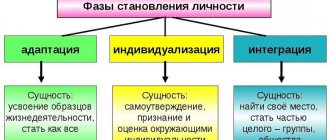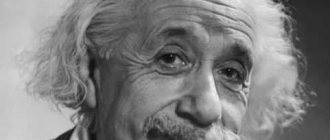Before we talk about the formation of personality, we need to understand what “personality” is. Traditionally in psychology, this term describes a model of role behavior that is formed under the influence of social expectations. Thus, a person acquires socially approved habits and skills: he becomes well-mannered, educated, receives a profession necessary for society and realizes himself in it.
A later and, therefore, more modern approach describes personality as an independent and unique entity, the development of which is not subject to social expectations, but to personal growth and self-improvement. A person develops as if in opposition to society, trying to stand out from the masses.
At first glance, the described points of view seem mutually exclusive. Nevertheless, the theses they postulate are confirmed in the life of every person, as we will show below.
Personality traits briefly
A property is a concept that reveals the essence of a certain phenomenon. And what, if not the structure, does this best. Therefore, let's take a closer look at some of the components of personality.
- Capabilities. It is a measure of how far a person can progress in a particular activity. If we compare them with inclinations, then these concepts correlate with each other, at least and maximum. A little simplified, but it doesn’t change the essence of the matter. These are the areas of a person’s life in which he is strongest.
- Temperament. These are the properties of the physiological basis of the psyche - the nervous system. Recently, the very concept of “temperament” has been used quite rarely, but in everyday life it is quite possible to use it. In fact, temperament comes down to the relationship between two main properties of the nervous system - excitability and inhibition. The type of higher nervous activity of a person depends on how long each of these processes lasts.
- Motivation. This is a complex phenomenon that describes the reasons why a person acts as he does. Motives can be delayed or immediate. In the latter case, classical “stimulus -> response” conditioning works. If we are talking about delayed incentives, this is what requires the inclusion of the human will. For example, don’t spend money today to get more tomorrow. But this is only one of the options. Deferred motives always work in the future.
- Character is a set of established behavioral reactions of an individual under certain conditions to specific stimuli and irritants. The main component of character is habit.
- Will. This refers to a measure of a person’s ability to overcome momentary temptations in order to achieve a certain goal. It is always used for a task.
- Emotions. They can help you achieve your goal or hinder it. It all depends on the specific psychological state of the individual. Emotions have a signaling function. They tell a person that everything is fine or that something is wrong and require certain actions.
Adolescence (12-16 years)
The teenager is faced with a feeling of loneliness and misunderstanding on the part of adults. One of the most difficult periods. It is important here that he has friends to whom he can tell things that he cannot talk about with adults. Also, children at this age begin to more or less decide what they want to do in life.
During this period, it is important to support initiative and allow the teenager to open up if he is interested in some (acceptable) activity (creativity, technology, etc.).
The concept of personality in psychology
In psychology, personality is considered as a quality of an individual that he acquires in his objective activities and characterizes the social aspects of his life.
The individual, as a person, freely expresses his attitude towards the entire external world, and therefore his characterological characteristics are determined. The most important of all human relationships is relationships, that is, how a person builds connections with other people.
Personal nature always creates its views on various objects of reality consciously, based on its experience of existing connections with this object; this knowledge will influence the expression of emotions and reactions in relation to a certain object.
In psychology, the characteristics of personal nature are associated with its orientation toward some subject of activity, area of life, interests, and entertainment. Direction is expressed as interest, attitude, desire, passion, ideology and all these forms are the motives of the individual, that is, the guides of his activities. How developed the motivational system is characterizes a person’s personality, showing what it is capable of and how its motives are transformed into activity.
To exist as a person means to act as a subject of objective activity, to be a subject of one’s life activity, building social connections with the world, and this is impossible without the individual’s involvement in the lives of others. The study of this concept in psychology is interesting because it is a dynamic phenomenon. A person has to constantly fight with himself, satisfy his certain desires, restrain his instincts, find ways to reach a compromise for internal contradictions and at the same time satisfy his needs, so that this is done without remorse, and because of this he is constantly in continuous development, self-improvement.
Conclusions and advice
As was said from the very beginning, there is no end to this process, since we constantly have to face difficulties, changes of views, etc. The process is too individual, but in most cases, the main “skeleton” of the personality will be formed before the age of 23-25 years. Two main aspects will help shape your personality:
- Acceptance of all your strengths and weaknesses, as well as pushing aside the opinions of others and redirecting the focus to your own desires and needs;
- The desire to develop and try new things. Getting rid of the fear of learning something new for yourself (even if this “new” is a little uncomfortable).
That's all, we hope that the information was useful to you. Write in the comments what stage you are at now and what problems you have encountered.
The influence of society on personality
Personality and social environment are inextricably linked. Its future depends on the environment in which a personality is formed. Seeing bad examples and irresponsible behavior in front of him, the child perceives this as a model. After some time, he may begin to behave the same way as his friends and people close to him. He may start drinking, smoking, stealing, without knowing that such behavior is the result of formed views on the world, the bad influence of his immediate environment.
Sometimes a person can fall under the bad influence of the social environment despite his desire. A schoolboy begins to smoke, fearing the ridicule of his classmates, who have long been addicted to cigarettes. A teenager decides to steal because of his friends’ obsessive persuasion to get easy money. An employee deceives his superiors after much persuasion from his colleague.
The positive influence of the environment on personality development is also manifested. Seeing before him examples of successful, happy and respected people, the child strives to imitate them and copy their behavior. Therefore, at school a lot of time is devoted to studying the biographies of national heroes, patriots, and outstanding personalities. A good example becomes an inspiration for work, creative activity, and activity in society.
(Source)
Different structures of society have varying degrees of influence on the individual.
- Parents and close relatives have the greatest influence when raising a child from infancy.
- Second in terms of influence are school teachers.
- They are followed by friends, acquaintances, colleagues.
- The media play an important role (mass media: Internet, television, print media).
In addition, the individual is influenced by the socio-cultural environment characteristic of the state and the area in which he lives. So in Russia, the USA, India, Israel - the conditions for the formation of a personality are significantly different. Thanks to this, individual peoples and the population of different countries have their own distinctive character traits and individual characteristics.
Individual and individuality
An individual is a separate representative of the human race by virtue of his birth. The qualities of an individual are manifested in his appearance: eye shape, leg size, hair color, and so on. An individual has innate inclinations and abilities, but will become an individual only in the process of social development.
The concept of individuality is different from the concept of individual. Individuality is the characteristics of an individual, its uniqueness, originality. It includes intellectual, spiritual qualities and physical characteristics. Individuality manifests itself when a person makes choices, makes independent decisions, or engages in any activity.
The concept of individuality is inextricably linked with personality. The relationship between the concepts of individuality and personality is manifested in the fact that a person who is an individual will necessarily demonstrate his individuality in interaction with society.
What does it mean to be a person?
Plan:
-What does it mean to be a person? — Individuals are not born, they become individuals — Signs of personality — The process of becoming an individual — 5 simple tips. How to develop your personality? - How to be an individual? Advice from psychologists - How do you become a person? Practical steps - Tips on how to become a harmonious person - Personality formation: what is needed? - Conclusion
Personality is an individual who is the result of mental activity
It is important to remember that such a person has a whole complex of socially significant elements that are successfully implemented in public life
Recently, more and more people are striving for self-development and self-improvement. More and more people are trying to live meaningfully, setting goals and working towards them. This, of course, makes me happy. But how to become a Personality? How not to get lost in the crowd?
I want to start my answer with a question: So, do you think that you are not a person? If you need to become a person, then at the moment you are not one. How did this opinion come about?
If you follow the train of thought of the person who asked such a question, it becomes clear that the idea could only come from external sources, negative opinions, and the assessments of others. Such a formulation would not occur to a holistic person who perceives himself as an individual.
For your information, I will give a definition from Ozhegov’s explanatory dictionary of the Russian language. “Personality is a person as a bearer of some properties.” Based on this definition, everyone is a person.
Therefore, the problem of the person who asked the question can be reformulated - how to become holistic, perceive oneself as a person?
Initially, we are born as individuals. In the process of growing up, giving up the value of one’s opinions, one’s desires, accepting the priority correctness of the opinions of adults, a person loses integrity, a sense of himself as a valuable person. Of course, after all, he was told so many times that what he was doing was wrong, bad, that he decided to agree with it. At this moment his future problems begin.
Let's skip the period of accumulation of troubles. Let's go straight to the moment of asking the initial question: What does it take to become a person? Great question! This means that you are ready to become her again. To do this, you need to start becoming yourself. First of all, OBSERVE. For life, for yourself, for relationships. From observations, create your OWN POINT OF VIEW. The opinions of others, any information is only an impetus for reflection and research.
Listen to yourself and do what you want. Don't suppress, don't scold yourself. LOVE AND ACCEPT YOURSELF. It's very difficult at first. After all, first you will have to deal with all the accumulated burden of anger, unlove and shame for yourself. When you feel whole, accepting yourself, then you again become a full-fledged person. Good luck to everyone on this journey.
Read about personality degradation.
What is personality in psychology? Its structure
For a detailed analysis of this concept, it is necessary to delve into the meaning of not only the term “personality” itself, but also to understand some related concepts. This is one of the most important topics when teaching students general psychology. So, a person is born an individual. This is a representative of its biological species, not yet socialized.
Then he adapts to society and becomes an individual. And everyone has their own individuality, that is, those traits that only they have.
So, personality is a socialized individual. It can also be considered as a set of mental properties that determine its subjectivity. Simply put, a person is someone who changes and influences. Whether we want it or not, our every word and action affects the environment. That is why we can be called individuals. But both concepts must be considered as components of a single term. The subjective nature of a person is associated with certain of his qualities, and the degree to which influence can be exercised depends on them.
Let's look at the structure of the personality itself. First of all, it is worth understanding that this is a very ambiguous concept, since there are many classifications denoting the constituent elements and their relationships. Each researcher understood it depending on the psychological paradigm to which he adhered. But here is one of the common theories according to which personality includes:
Cognitive sphere. Simply put, everything that helps a person understand the world around him. This includes thinking, memory, perception and imagination
Naturally, attention is a prerequisite, without which there can be no active cognition. Yes, and passive too.
Affective sphere
This includes everything that is associated with mental states: emotions, human feelings.
Worldview. This is how we see the surrounding reality.
Conscious and unconscious.
Character, temperament, abilities.
Culture and art
The role of art in the formation of personality is also important and is the basis for the formation of a person as an individual. Understanding the world around us, studying history, immersing ourselves in art - all this helps to develop beyond the basic needs for food and socialization. Art is not the determining factor; the role of society in creating individuality is much more important. But it helps:
- think more broadly and critically;
- protect your “I” from mass views;
- find harmony between yourself and the world around you;
- express yourself;
- understand your inner world;
- destroy stereotypes, attitudes, social constructs.
Without immersion in culture and art, it is unlikely that you will be able to expand the boundaries of your own consciousness, go beyond the narrow boundaries of upbringing, and step over the pressure of society.
Personality in psychology
Let's first understand what it means to be a person in order to avoid confusion on this issue. In the classical sense, personality is a set of properties and characteristics of a person that are acquired by him in the process of living in society and active interaction with other people.
The key word in this concept is “society”. In order to become a person, we just need to be born, but in order to become a person, a little person needs to integrate into the social environment.
In this regard, the question arises: does every person become an individual? The answer is no, not everyone. If a person spent the first years of his life isolated from people, he will no longer be able to become a full-fledged member of society.
Brain structures responsible for higher mental functions, such as speech, thinking, memory, attention, are formed in the first five years of life. This happens by transforming external processes into internal ones
The child hears the speech of adults, begins to copy it, then transfers the speech inside - this is how thinking is formed.
If there is no example to follow, these functions will have nowhere to come from.
So if you are able to read these lines, you don’t have to worry - you already have a personality, like 99% of the Earth’s population. What kind of meaning then do people put into the expression “become a person”? You've probably heard it more than once.
The process of becoming a person is touched upon both in philosophy and in fiction. What is meant by it is not so much the formation of higher mental functions, but rather the acquisition by an individual of properties that provide him with a high place in the social hierarchy.
In order for this expression to correspond to its generally accepted meaning, the word “strong” must be added to it. Becoming a strong personality is what people who already have a personality strive for, but they don’t know it. This is what you and I will work on. I will tell you how to strengthen, enhance your personality and make it competitive.
The concept of personality in sociology
The concept of personality in sociology, its essence and structure, are of separate interest, since the individual is mainly assessed as a subject of social connections.
The concept of personality in sociology can be briefly summarized in some categories. The first is social status, that is, a person’s place in society, and in connection with this certain obligations and rights. One person can have several such statuses. It depends on whether he has a family, relatives, friends, colleagues, work, thanks to which a person socializes. So, for example, one person can be a son, husband, father, brother, colleague, employee, team member, and so on.
Sometimes multiple social statuses demonstrate a person's social activity. Also, all statuses are divided depending on their meaning for the individual himself. For example, for one the most important is the status of a company employee, for another – the status of a husband. In the first case, a person may not have a family, so work is the most important thing for him and he identifies himself with the role of a workaholic. In another case, a person who recognizes himself primarily as a husband puts other areas of life into the background. There are also general statuses, they carry great social significance and determine the main activity (president, director, doctor), and also, along with the general, non-general statuses may be present.
When a person is in a social status, then accordingly she performs certain actions prescribed by the model of behavior, that is, the social role. The president must lead the country, the chef must prepare dishes, the notary must certify papers, children must obey their parents, and so on. When an individual somehow fails to properly follow all the prescribed rules, he jeopardizes his status. If a person has too many social roles, he exposes himself to role conflicts. For example, a young man, a single father, working late to feed himself and his child can very soon burn out emotionally from an oversaturation of actions dictated by social roles.
Personality, as a system of socio-psychological characteristics, has a unique structure.
According to the theory of psychologist Z. Freud, the components of the personality structure are three components. The basic one is the unconscious authority of the Id (It), which combines natural stimuli, instincts and hedonic aspirations. The id is filled with powerful energy and excitement, so it is poorly organized, disordered and weak-willed. Above the Id there is the following structure - the Ego (I), it is rational, and in comparison with the Id it is controlled, it is consciousness itself. The highest construct is the Super-Ego (Super-I), it is responsible for the sense of duty, measures, conscience, and exercises moral control over behavior.
If all these three structures interact harmoniously in a person, that is, the Id does not go beyond what is allowed, it is controlled by the Ego, which understands that the satisfaction of all instincts can be a socially unacceptable action, and when a Super-Ego is developed in a person, thanks to which he is guided by moral principles in his actions, then such a person deserves respect and recognition in the eyes of society.
Having understood what this concept represents in sociology, its essence and structure, we can conclude that it cannot be realized as such if it is not socialized.
The concept of personality in sociology can be briefly described as a set of socially significant properties of an individual that ensure his connection with the outside world.
The concept of criminal personality in criminology
Psychology plays a huge role in criminology. People involved in investigations must have knowledge in the field of psychology, they must be able to analyze the situation from different angles, explore all possible options for the development of events and at the same time the nature of the criminals who committed the crime.
The concept and structure of the personality of a criminal is the main subject of research by criminal psychologists. By conducting observations and research on criminals, it is possible to create a personal portrait of a potential criminal, this in turn will make it possible to prevent further crimes. In this case, the person is examined comprehensively - his psychological characteristics (temperament, accentuations, inclinations, abilities, level of anxiety, self-esteem), material well-being, his childhood, relationships with people, presence of family and close friends, place of work and other aspects are studied. To understand the essence of such a person, it is not enough to conduct psychodiagnostics with him; he can skillfully hide his nature, but when in front of his eyes there is a whole map of human life, one can trace the connections and find the prerequisites for a person becoming a criminal.
If in psychology they speak of personality as a unit, that is, a characteristic of an individual, then in criminology it is rather an abstract concept that is not given to an individual criminal, but creates his general image, consisting of certain properties.
A person falls under the characteristic of a “criminal personality” from the moment he committed his ill-fated act. Although some are inclined to believe that even earlier, long before the crime itself was committed, that is, when an idea was born in a person and he began to nurture it. It’s more difficult to say when a person stops being like that. If a person has realized his guilt and sincerely repents of what he has done, and sincerely regrets what happened and its inevitability, he has already gone beyond the concept of a criminal personality, but the fact remains a fact, and the person will be punished. He may also realize that he made a mistake while serving his sentence. I may never understand. There are people who will never give up the fact that they committed an ill-fated act, even if they suffer painful punishment, they will not repent. Or there are also repeat offenders who, after serving one sentence, are released, commit a crime again, and so can wander back and forth for the rest of their lives. These are pure criminal natures, they resemble one another and fall under the general description of a criminal.
The personality structure of a criminal is a system of socially significant characteristics, negative properties, which, together with the situation prevailing at that moment, influence the commission of offenses. Along with the negative qualities, the criminal also has positive qualities, but they could be deformed in the process of life.
The concept and personality structure of the criminal must be clearly clear to criminologists in order to be able to protect citizens from the threat in the first place.
Youth (16-23 years old)
An individual chooses a profession, studies, and begins to finally decide on his place in society. The main task:
- choosing and mastering your favorite activity;
- job search;
- making money;
- independence training;
- separation from parents (moving to another country/city for study/work, etc. can be useful).
It is important to close these aspects of life so that in the next stages the person can deal with others. The formation of the body gradually ends, and at the same time improvement occurs in the direction of cognitive abilities.
People are not born as individuals, they become individuals.
Before considering how a person becomes a person, it should be noted that there are two opinions about whether every person can become one.
1) Some argue that in the process of socialization and development, every living unit of Homo sapiens becomes a person to one degree or another.
2) Another group of specialists indicates that there is a circle of people who cannot be called individuals. Such people do not develop in the process of their development, but degrade.
Personality cannot be formed at the moment of birth; it is formed in the process of socialization of the individual, i.e. gradually. Everyone knows that babies cannot express their thoughts because their brains are not yet developed enough; cannot express their views and tastes, have no moral guidelines. Their behavior is initially subordinate to instincts.
After all, all our views and beliefs are formed gradually, over quite a long time, and do not appear immediately after birth.
The term “personality” itself means the internal characteristics of a person, his spiritual world (opinions, interests, guidelines). A person becomes a person in the process of such a phenomenon as socialization. Socialization refers to the process of a person’s adaptation to generally accepted rules of behavior in society, its traditions and values.
Thus, we can conclude that a person becomes a person not at the moment of his birth, but gradually, going through the process of socialization. That is, in essence, the formation of personality is a process of assimilation of norms and values that are relevant for a particular society.
You may be interested in the article “Personal Magnetism“.
The main stages of personality development according to A. N. Leontiev
Methods for resolving conflicts - what options exist, ways to prevent them
The development of a person’s personality occurs throughout his life, starting from infancy. In this process, the individual develops comprehensively, he develops a certain attitude towards the outside world. A. N. Leontyev formulated the concept of “leading activity,” which determines the development of the child’s psyche, based on what satisfies his needs:
- In the initial period from 2 months to 1 year, the baby needs direct emotional communication with a parent or other adult;
- From 1 year to 3 years, a young child is characterized by objective activity, with the help of which he learns about the world;
- From 3 years old to 6-7 years old, a preschooler is characterized by role-playing games, during which he imitates an adult and tries to be independent.
- A schoolchild from 6-7 years old to 10-11 years old undergoes educational activities where he learns more deeply about the world, and also approaches the desire to be an adult.
Personality formation occurs most actively in children
- A teenager aged 10-11 – 14-15 years old satisfies the need for the company of peers, which is called intimate-personal communication.
- Boys and girls aged 15-17 years begin educational and professional activities, which plays a big role in self-determination.
How does personality development occur?
In order for you to experience stable personal growth, you need to activate all the described mental functions. You need to start with willpower. A big mistake is made by those people who try to force themselves to do something or overcome momentary temptations with only one “tool”. Many people train willpower in isolation, which is wrong, since the psyche is a single mechanism. How can you make an engine run without gasoline? Then it will simply burn out. The same will happen with the psyche. When a person does something without motivation and the ability to evoke the right emotion, it does not always end successfully.
You yourself have probably had situations when you were able to sit down to work only when you told yourself: “get yourself together, you wimp.” A necessary condition for personal development is to strive to achieve your goal. And on the way to this point, everything must be included. Through an effort of will, begin to think in a certain style, which helps to evoke the desired emotion, which lays the foundation for motivation. In general, you need to mobilize your entire mental apparatus in order to overcome difficulties.
Hard to learn, easy to fight, as they say. At first, driving a car is a panic. Keeping everything in your head seems incredibly difficult. But after a while all these actions become automatic. A similar principle is characteristic of personality development.
Infants(1-3 years)
The most rapid period of development, children at this age:
- absorb everything like a “sponge”;
- observe adults;
- repeat their habits, etc.
One of the most important stages, since it lays the foundation and largely determines what the individual will be like in the future. It is important for parents to show care and understanding, demonstrate patience and responsibility. The child becomes more “understanding”, but most of the time, still continues to be guided by basic instincts.











